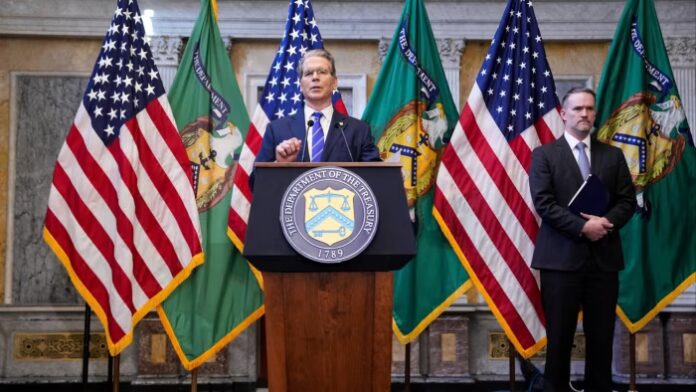Unlock the White House Watch newsletter for free
Your guide to what Trump’s second term means for Washington, business and the world
Treasury secretary Scott Bessent warned Beijing that its new sweeping export controls on rare earths and critical minerals would force the US and other countries to decouple from China.
Speaking alongside US trade representative Jamieson Greer at a news conference on Wednesday, Bessent said China was taking on the entire world with the regime.
“If China wants to be an unreliable partner to the world, then the world will have to decouple,” Bessent said. “The world does not want to decouple. We want to de-risk. But signals like this are signs of decoupling, which we don’t believe China wants.”
Beijing last week unveiled the regime for rare earths and critical minerals that will require non-Chinese companies exporting products containing even small amounts of the minerals to obtain a government licence.
The move sparked condemnation from the US and other countries, which believe it will have a big impact on global supply chains given China’s dominance in the rare earths industry. President Donald Trump threatened to impose an additional 100 per cent tariff on imports from China and other countermeasures by November 1.
Greer said the Chinese export controls, which are scheduled to come into effect in December, would have a global impact.
“While China has taken a number of retaliatory trade actions against the United States, Europe, Canada, Australia and others in recent years, this move is not proportional retaliation. It is an exercise in economic coercion on every country in the world,” said Greer.
Greer and Bessent said the US was insisting that China not proceed with implementing the controls.
Greer added that the rule gave China control over the entire global economy and the technology supply chain. “This will impact artificial intelligence systems and high-tech products, but even regular consumer items like cars, smartphones and potentially even household appliances,” he said.
China has defended its rare earth controls by saying that Washington had introduced punitive measures on Chinese companies since US and Chinese negotiators held a fourth round of trade talks in Madrid last month. Washington has rejected that argument and said Beijing appeared to have been planning the measures for some time.
Bessent and Greer also criticised Li Chenggang, the top negotiator on the Chinese trade team led by vice-premier He Lifeng, who is the US Treasury secretary’s counterpart.
Bessent said Li made an uninvited visit to Washington in August, where he was “very disrespectful” — unlike the other members of the Chinese delegation in the four rounds of trade talks — and threatened “global chaos” if the US proceeded with a plan to charge fees to Chinese ships docking at American ports — a policy that came into effect this week.
“Perhaps he has gone rogue,” Bessent said.
Bessent said he still expected Trump to meet China’s President Xi Jinping in South Korea on October 29, when the two leaders attend the Asia-Pacific Economic Cooperation forum.
The Treasury secretary added he was “optimistic” that the two sides could de-escalate the situation. But he and Greer have also made clear that the Trump administration will hit back with tough measures if China does not respond.
Some experts believe Beijing is calculating that the imposition of the rare earths export control programme will force the US to consider easing its export controls on semiconductors and chip-related technology.
Asked at a separate event with reporters whether the US would put its export controls on the negotiating table, Bessent said: “I’m not going to pregame what the negotiations are going to look like.”
But he added that one relevant question was whether China would delay the implementation of the export control regime.
The US and China have rolled over successive tariff deadlines since agreeing a ceasefire in the trade war earlier this year. The current 90-day window expires in mid-November.
Source link






